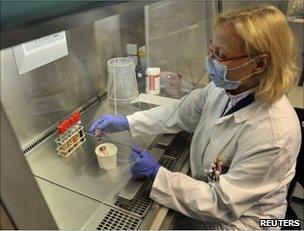E. coli outbreak alarms Germany as young women sicken
- Published

Samples are being studied at the UKE laboratory in Hamburg
Germany is alarmed at the scale of an E. coli food poisoning outbreak which is thought to have killed three people and may have infected hundreds more.
At least 80 people ingested EHEC, a dangerous strain of the bacterium, over the past two weeks and there are a further 350 suspected cases.
The number of EHEC infections for the whole of 2010 was only about 1,000.
This outbreak is affecting young women in particular, and one theory is that it is spread by contaminated salad.
While medical tests have yet to establish the exact cause of death, the three suspected victims were all women, two of them in their 80s and the third aged 24.
'More deaths likely'
E. coli is a bacterium commonly found in the gut and most strains are harmless, according to the World Health Organization, external.
It is transmitted to humans primarily through consumption of contaminated foods, such as raw or undercooked ground meat products and raw milk, as well as by animal faeces getting into water and food, and by cross-contamination during food preparation.
The EHEC strain may cause hemolytic uremic syndrome (HUS), which is characterised by acute kidney failure and can lead to seizures, strokes and coma.
Reinhard Burger, head of Germany's Robert Koch Institute which monitors epidemics, said the country usually saw between 50 and 60 cases of HUS annually, whereas it had recorded about 80 during the current outbreak.
"The source of the outbreak has not yet been identified," Mr Burger said on Tuesday.
"We have to say clearly that we have to expect more fatalities in view of the high number of cases."
The head of the country's national disease control and prevention agency added that the age groups affected were "atypical".
'Untypical'
So far, most of the suspected cases have been found in northern regions. Some 200 were found in Schleswig-Holstein, 100 in Lower Saxony and nearly 50 in Hamburg.
In Bremen, where the youngest suspected victim died, health authority official Werner Wunderle told reporters that the 24-year-old had not belonged to normal risk groups for EHEC.
"Affected are mostly young women, that is untypical for EHEC," he said.
"Normally this bacterium affects children and youth. Every year we have cases of EHEC in Bremen and more than 80% are under 18 years old. It's very untypical that mostly adults are concerned and predominately women. Also, it's predominately women who are health conscious."
A Reuters news agency report suggests that the infection may be spread through contaminated vegetables, and the high number of affected young women points to a product more often bought or prepared by women.
Susan Huggett of the Medilys laboratories in Hamburg advised against eating pre-packaged or prepared salad, which might contain the bacterium.
She also recommended standard hygienic procedures such as washing hands before eating or cooking.